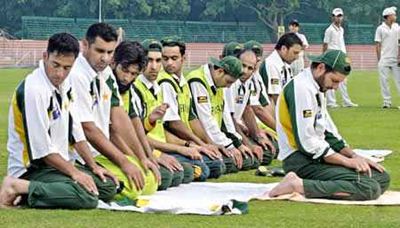Prayers
in Islam, Part-6
- Gheyas S
Mahfoz Hashmi, Jeddah
(hgheyas@savola.com)
……. Continued from previous issues.
In Apr 2010 issue we have mainly mentioned that one who is negligent of
his 5-time prayers is getting bad news all around him. No salvage is
forthcoming. Here we are going to discuss the sincerity in prayers.
There are two types of sincerety, one is visible and other is not
visible. The visible means a prayer should be exactly the same way our
prophet (S) performed, without any personal addition or deletion. The
invisible is the condition of the heart that is known to Allah alone.
That is to say prayers should be free from any eye-service and
duplicity. A littel prayer with sincerity is better than an abundance
of prayer with lack or loss of sincerity. Allah says, “ He will try you
which of you best in action” (Hood/7).

However, while praying, we should maintain our outer and inner
appearance in the required manner. All basic requirements must be
correctly met. Allah says in Surah (A'raf): O Children of Adam! Wear
your beautiful apparel at every time and place of Prayer. We should
stand in full submissiveness and complete humbleness. Our Salah should
be the manifestation of our meekness, lowliness and
smallness. Emam Ahmed bin Hanbal (may Allah have mercy on
him) reported in his book "Salah" that Allah has inspired Jesus and
Moses saying: "Whenever you stand in front of Me, be like a despised, insignificant
and
mean mankind.

|
Because,
this human being is highly condemnable. When
you call Me, call in such a way that your parts of the body are falling
off."
Bowing
down and prostration must be
complete. We are required to gain full knowledge of obligatory and
essential portions (Furud & Wajayeb) of prayer in order to make
our
prayers perfect and valid. In this connection, a very famous Hadith is
quoted that reads; "A man entered the mosque and prayed.
Then, he sat
near our prophet (pbuh). The prophet asked him if he performed the
prayer. He replied in affirmative. The prophet said he din 't. Go and
repeat it. He repeated and sat again near the prophet. The
prophet
asked him again if he said Salah. He said, "Yes! O' prophet of Allah."
The prophet told him he didn't. Go and repeat it again. He prayed 3-4
times but in vain. Then, the prophet taught him how to pray. He did as
per the prophet's instructions and completed his prayer."
If
we see errors in people's
prayers, we should not be a silent spectator but we are required to
inform politely. This is duty of the Ummah of the
last
prophet (PBUH). No prophet will now come to guide us as they used to
come
before. The Quran and Hadithes are guidelines and manuals for us. We
are also guides for each other. Our prophet (PBUH) said: "Those, who
notice an error in someone's prayer and do not rectify, would equally
share their errors and sins"(Reported by Ibn Mas'oud). The other Hadith
at the authority of Abu Horairah reads: "The man will be resurrected at
the day of judgment along with his neighbours. His neighbours
will
say," O! My Lord, he has embezzled us. The man will reply, "My Lord, by
Your Glory, I have not embezzled them in their properties and
children. Then, they will say," O my Lord! He is right, but
he did not
prevent us from committing sin."(Quoted by Munzari in Al Targhib).
This
Hadith is also supported by another Hadith reported by Abu Sa'id Khidri
and says: "If anyone of you sees evils, he should change it by his own
hand. If he is not in a position to do it, he should prevent
it
verbally. And if he is not able to do it, he should take it bad in his
heart which is the lowest degree of belief". (Related by Muslim). First
action is by responsible person (ruler, governor, etc), 2nd is for all
of us to tell them about goodness and badness. Those who just feel
about someone that they are doing wrong but not telling them are at the
lowest degree of Eman, and what to say about those whose feeling is
dead.
….… to be continued.

|

 Download pdf (2.6 mb)
Download pdf (2.6 mb)

 Download pdf (2.6 mb)
Download pdf (2.6 mb)